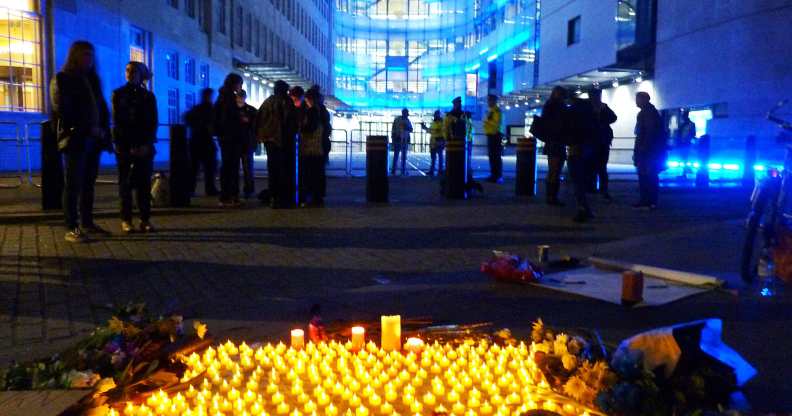Yet another protest planned over BBC’s ‘clear agenda of hate’ against trans people

A vigil held to mark Trans Day of Remembrance outside the BBC’s London headquarters, 20 November 2021. (Martha Dunkley)
A demonstration outside the BBC’s London offices against its anti-trans “agenda of hate and discrimination” will be at least the seventh protest against the broadcaster in the last two months.
“Platforming hate is not impartial” reads an online flyer for the protest, which is planned for 1pm on 8 January.
“Can’t ignore the recurring platforming of bigots with a queerphobic agenda?” it adds. “Join us!”
Protests against the BBC broke out in several cities in November and December – including outside its offices in Bristol, Cardiff, Manchester, London and Brighton – after the publicly-funded broadcaster published a 26 October BBC News article headlined: “We’re being pressured into sex by some trans women.”
The BBC was widely condemned for using a self-selecting survey of 80 people who support an anti-trans campaign group to claim that trans lesbians are routinely pressuring cis lesbians into sex.
Non-binary comedian Mae Martin joined a 7 November protest, also outside the BBC’s London offices, saying: “You can’t tell from my grin how unsettled I am by the fact that BBC and other UK media continue to uncritically platform misinformed, demonstrably biased and transphobic opinions.
“It’s bad journalism and it’s contributing to a culture of hysteria that makes life scarier for trans/non-binary people in this country (and it was already scary).”
A vigil was also held outside the BBC’s London offices on Trans Day of Remembrance (20 November) to remember and honour the trans lives lost to violence.
Are you tired of the UK's government-sanctioned broadcasting corporation promoting a clear agenda of hate and discrimination?
Can't ignore the recurring platforming of bigots with a queerphobic agenda?
Join us on 8th Jan 2022 at 1PM, Broadcasting House!#TransRightsProtest pic.twitter.com/uqMPfS89ko
— Trans Activism UK (@TransActivismUK) October 26, 2021
One of the protest organisers told PinkNews that the BBC’s trans coverage “has been on a backward slide in terms of quality and tone since at least 2016, when a disinformation campaign around GRA reform and what it would mean in practical terms caused a noticeable shift in the way stories about the trans community were reported”.
“This has been a gradual decline that has included increased uncritical platforming of anti-trans hate groups, only presenting trans people’s perspective if ‘balanced’ with an anti trans voice as a matter of policy, and presenting stories that imply, inaccurately, that trans people are a danger to the public.”
The protest organiser added that while the 26 October article was “particularly bad”, it was “far from the first sign that something is systematically wrong at the BBC”.
“That article was the most clearly and unapologetically direct example yet of the BBC presenting the trans community as predators based on decontextualised biased sources and misinformation, but the fact it was so out in the open with its hate was a worrying step up, and we knew we needed to act.”
BBC condemned as ‘institutionally’ anti-trans by MPs
The 26 October article by BBC News journalist Caroline Lowbridge initially platformed transphobic porn performer Lily Cade, who has been accused by multiple women of sexual assault.
The broadcaster eventually removed Cade from the story when it was discovered she called for the mass “execution” and “lynching” of trans women, but still refused to remove the article.
It later emerged that trans sex worker Chelsea Poe had told Lowbridge about the sexual-assault allegations against Cade prior to publication – but Poe was not quoted in the 26 October article, because she didn’t “fit their narrative“.
The article was strongly defended by the BBC as having gone through a “rigorous editorial process”, despite not including a single interview with an opposing viewpoint, and more than 16,000 people signed an open letter demanding that the broadcaster apologise for the article.
The BBC later said it was a “complex” issue but did not issue an apology or remove the piece.
The UK’s public broadcaster has been regularly criticised for its coverage of trans people.
In 2020, senior MPs branded the BBC “institutionally transphobic“, while concern over the broadcaster’s stance continued this year when thousands condemned it for “uncritically platforming” anti-trans groups like the LGB Alliance. Others have said it is “censoring” trans issues.

